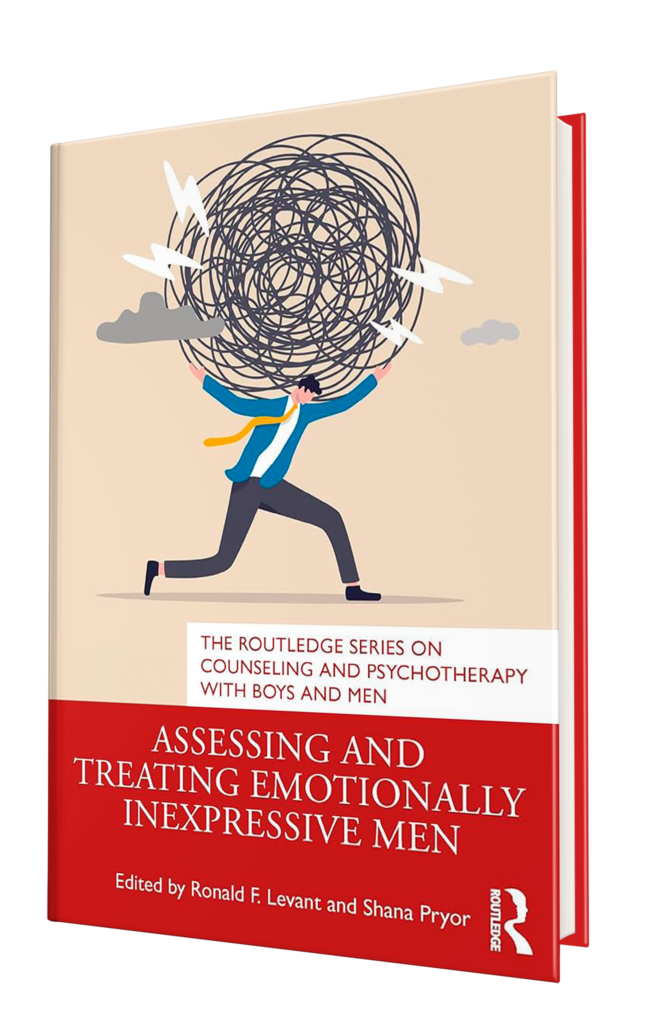The Problem with Men
Insights into Overcoming a Traumatic Childhood from a World-Renowned Psychologist
Why do men commit acts of violence, struggle to talk about their emotions, misuse their power, or take risks with their health? The Problem with Men offers the surprising answer. Dr. Ron Levant, a world-renowned psychologist, has spent his career trying to understand men like his abusive father as well as his own perplexing behavior. Using his lived experience as the backdrop, Levant takes readers on a gripping and, at times, heartbreaking journey of discovery, providing a rare front-seat glimpse at acid tests, threesomes, communes, state psychiatric institutions, jails, encounter groups, therapy sessions, wayward youth programs, fatherhood courses, and men’s groups. With grace, honesty, and insight, Dr. Levant reveals his own struggles to overcome his upbringing and become a better man in his quest to help readers understand the societal forces that shape men for the better—and the worse.
—Shana Pryor, PhD, psychology fellow at Naval Hospital Okinawa
“Epic story of overcoming setbacks and achieving success. Amazed at how much detail Dr. Levant remembers going back to his early childhood.”
—Martin H. Belsky, JD, dean and professor emeritus of law, The University of Akron
“Tells the remarkable story of a life of activism, research, and social contribution by an eminent psychologist and founder of the psychology of men, offering some life-lessons in resilience for all of us.”
—Joseph H. Pleck, PhD, professor emeritus of human development and family studies at the University of Illinois at Urbana-Champaign
“This is an important narrative about interrupting the family cycle of violence and abuse. Trauma is too often passed down from father to son and then on to the next generation until someone like Ronald Levant gains the information and courage needed to end it.”
—Christopher Kilmartin, PhD, independent consultant, professor emeritus of psychology, University of Mary Washington
“This book is a must read for those who would like to understand the life of one of the most influential, if not the most influential person in the study of the modern American man. It is of particular value and inspiration for those who have struggled to overcome adversity and hardships in life.”
—Michael Andronico, PhD, private practice, Bridgewater, NJ, past president of American Psychological Association Divisions 49 and 51
“Dr. Levant weaves a compelling and brutally honest narrative of childhood trauma, grit, and resiliency. This book speaks to the traumas that so many young men experience from their fathers and bullies, the mental health conditions that men struggle with in silence, and the way those experiences can shape our lives. Every chapter has useful life lessons stemming from a lifetime of personal growth and psychological knowledge.”
—Ryon C. McDermott, PhD, professor of Clinical and Counseling Psychology, University of South Alabama, past president of the Society for the Psychology of Men and Masculinities, Division 51 of the American Psychological Association
Assessing and Treating Emotionally Inexpressive Men
What if your new client, a man in his early 40s, cannot answer basic questions in your initial assessment interview? You were aware that many men do not like to talk about their feelings, but this client seems kind of frozen. You think he might be alexithymic, but you do not know how to assess for that, or even more importantly, how to treat it. Assessing and Treating Emotionally Inexpressive Men has answers. Chapters explain why some men are emotionally inexpressive because of their childhood socialization, and the book provides both scales for assessing alexithymia in men and treatment manuals for helping these men became more emotionally self-aware in individual and group therapy. The book also offers case studies that explain how to integrate the authors’ approach with any model of psychotherapy. Clinicians will come away from this book with a clear sense for how to treat alexithymia in the early sessions of psychotherapy and thereby improve treatment uptake and outcomes.
“Providing psychotherapy for men who ‘feel nothing’ or deny emotions can prove challenging at best, and often intensely frustrating for many therapists. Long known for his expertise on the special needs of men in psychotherapy, Dr. Ron Levant is joined by Shana Pryor in producing this excellent collection of chapters to guide psychotherapists in assessing and treating emotionally unexpressive men. Packed with clinically validated suggestions for both individual and group work, this book provides both a comprehensive overview and many ideas for starting points with clients who avoid, deny, or fail to recognize many of their own feelings.”
—Gerry Koocher, PhD, ABPP, former president of the American Psychological Association
“Augmenting their own considerable expertise, the editors have assembled a remarkable group of scholars and clinicians to produce the definitive volume on this very important and much neglected topic—a must-read for any psychotherapist who works with men.”
—Christopher Kilmartin, PhD, independent consultant, professor emeritus of psychology, University of Mary Washington
“Levant and Pryor have given mental health practitioners a true gift. The outstanding contributors in this book have developed a roadmap for treating men who are trying to ditch traditional masculinity and develop loving and fulfilling relationships. The evidence-based research and treatment put forward here belongs on your shelf immediately.”
—Lenore Walker, EdD, ABPP, professor emerita, College of Psychology, Nova Southeastern University
The Tough Standard
The Hard Truths About Masculinity and Violence
Men are commonly expected to act “masculine” (e.g., unemotional, self-reliant, tough, dominant, and fixated on sex) while avoiding stereotypically “feminine” traits (e.g., emotional expressivity, empathy, compassion, and nurturance). Few, however, realize that these qualities—when taken to the extreme—can cause emotional constriction, substance abuse, depression, poor physical health, aggression, and violence in men. Further, even though most men are not violent, decades of research have shown that masculinity is directly and indirectly related to sexual and gun violence and men’s poorer health. Considering how girls and women have benefitted from conversations on how to navigate their gender in a changing world, similar processes are urgently needed for boys and men. The Tough Standard connects the dots between masculinity and the present moment in American culture (defined by high-profile movements such as #MeToo, #MarchForOurLives, and #BlackLivesMatter), synthesizes over four decades of research in the psychology of men and masculinities, and proposes solutions to corresponding social problems.
“In their book, The Tough Standard, Levant and Pryor practically rip the topics from today’s headlines and situate the troubling events of men’s violence in a strong theoretical and empirical body of work, bringing light—instead of just heat—to the issues they address. It is a must-read as a resource to understand and engage in critical issues affecting our lives, families, and the fabric of society in the United States.”
—James R. Mahalik, PhD, Professor, Lynch School of Education and Human Development, Boston College
“Most acts of sexual assault and gun violence are perpetrated by men, yet most men are not violent. How then do we explain the connection between men and violence without condemning men? In this book, Ron Levant and Shana Pryor skillfully address this conundrum, by shifting the focus of analysis to masculinity. This book has the perfect blend of contemporary issues (e.g., the #MeToo movement), science, theory, and practical examples. I highly recommend it to anyone who seeks to understand the complex relationship between gender and violence.”
—Joel Wong, PhD, Professor of Counseling Psychology, Indiana University
“Take a deep breath and prepare to hold yourself and your community accountable. The Tough Standard takes an honest and well-researched look at the implications of modern masculinity. Accessible to both researchers and nonacademics alike, The Tough Standard pulls back the veil to reveal how we are all impacted—and indeed complicit—in the construction of modern masculinity. As we look to heal and move forward in a positive way, The Tough Standard offers invaluable insights and tools to get us there. It’s a comprehensive, thoughtful, and profound piece of work. A fine compilation of a lifetime of research and beautifully linked to the political and cultural moments of our time.”
—Cleo Stiller, author of Modern Manhood and Peabody Award-nominated television host
“In a nation awash in violence, Ron Levant and Shana Pryor’s wise book contains a vital message for the moment: Men may be the perpetrators of almost all of this violence, but they are not the only ones at fault. Rather, reared to strongly endorse masculine norms, they learn habits that often harm women, children, the earth, and themselves. Dr. Levant understands that traditional masculinity can be positive with its emphasis on protecting and supporting others. But too often, protection becomes possession, support becomes suppression, and men use their physicality to dominate. Dr. Levant and Ms. Pryor are neither apologists nor prosecutors of men. In this ultimately hopeful book, they contend that given more and better options, most men would choose a type of masculinity that heals rather than harms.”
—Neil Chethik, BSJ, Executive Director, Carnegie Center for Literacy & Learning; Author, FatherLoss: How Sons of All Ages Come to Terms With the Deaths of Their Dads and VoiceMale: What Husbands Really Think About Their Marriages, Their Wives, Sex, Housework, and Commitment
“The Tough Standard is the most important book on men and masculinity available today, and it couldn’t come at a more opportune moment. At a time when sex and gender issues are confusing and conflicted, Dr. Levant and Ms. Pryor offer a scientifically sound exploration of what it means to be a good man in today’s world. Drawing on 45 years of experience as a leader in the field of men and masculinities, Dr. Levant gives us a book that will change lives for the better. Unlike many evidence-based experts, he shares his own personal journey as a husband, father, and a man. I highly recommend this book for all those who want to understand why men are the way they are and how we can expand our understanding of masculinity to become our best selves.”
—Jed Diamond, PhD, author of 12 Rules for Good Men and The Irritable Male Syndrome
“A provocative, insightful, and useful book that is timely in addressing how men’s violence permeates our world. Levant and Pryor’s excellent data-based analysis on how masculinity ideology and gender role conflict/stress contribute to men’s violence toward others is significant in identifying what has been left out of many critical discussions on a national level and in men’s and women’s lives. This book is highly recommended to anyone wanting to understand the role that violent masculinity plays in explaining America’s number one problem—violence against other human beings.”
—James M. O’Neil, PhD, Professor of Educational Psychology, Department of Educational Psychology, Neag School of Education, University of Connecticut, and a licensed psychologist in private practice in South Windsor, CT
“What do men do when long-established concepts of masculinity no longer define the American male? In the workplace, the home, and even the military—perhaps the last bastion of traditional American masculinity—the roles of men are increasingly challenged. There are no easy answers to the complex and changing definition of masculinity, and Levant and Pryor do not pretend to present any. By a careful dissection of elements of traditional masculine identity, this book provides some insight into how such attitudes have shaped American men. The authors do a service by providing the reader not with answers but with framework for further discussion.”
—Morgan T. Sammons, PhD, ABPP, Executive Officer, The National Register of Health Service Psychologists
“A masterful analysis of what we know, what we need to know, and what we need to do about the connection between masculinity and violence. Levant and Pryor provide an essential understanding of male sexual and gun violence that is sensitive to racial/ethnic, cultural, and class differences. In addition, they offer insight into some tricky conceptual issues about masculinity and a sympathetic view of the challenges that men face in meeting ‘the tough standard’—today’s changing, diverse, and often contradictory expectations for them.”
—Joseph H. Pleck, PhD, Professor Emeritus, University of Illinois
“This is a critically important work from a leading scholar and founder of our modern psychology of masculinities. The authors synthesize decades of research across various disciplines to help us better understand how masculinities and violence intersect in the lives of some men. Using their experiences, Levant and Pryor wrote a book that is provocative, incisive, and relevant for us who work with masculinities.”
—William Ming Liu, PhD, Professor, University of Maryland and Editor, Psychology of Men and Masculinities
“We are well past the time for a serious discussion about the connection between masculinity and violence. Ron Levant and Shana Pryor are the perfect guides for an honest and evidence-based discussion about what is one of the most pressing concerns facing modern society. This is a thoughtful and intelligent book that helps the reader understand the underlying concerns that are much deeper than the common discourse about violence. At some point we all have to take a deep look at the culture of violence that influences us all and has vast consequences for many men.”
—Matt Englar-Carlson, PhD, Professor, Department of Counseling, California State University, Fullerton
“In The Tough Standard: The Hard Truths About Masculinity and Violence, Dr. Ron Levant and Shana Pryor take decades of authoritative work on masculinity in American men and describe how it can and has led to violence, as well as to economic stagnation and other social pathologies. At this moment of extensive feminist reawakening and intensification, by way of the #MeToo movement, and the importance of inclusiveness and intersectionality, Dr. Levant and Shana Pryor’s findings feel essential for men, women, and the culture.”
—John Kelly, author of The Graves Are Walking: The Great Famine and the Saga of the Irish People and The Great Mortality: An Intimate History of the Black Death, the Most Devastating Plague of All Time
“The Tough Standard is the new standard for understanding the shaping of masculinity and the risks of rigid overadherence to traditional norms. This critical volume also addresses the role of masculinity in modern social challenges, from gun violence to untreated trauma. An essential tool to understand today’s social problems and their links to gender socialization.”
—Mike C. Parent, PhD, Assistant Professor, University of Texas at Austin
“Dr. Ron Levant has devoted his impressive career to understanding and helping men. In this new volume, he reviews and synthesizes his substantial publication record with the available literature, providing new insights on a body of research and therapeutic work that spans four decades. The Tough Standard provides provocative evidence about how America’s traditional definition of masculinity contributes to men’s violence against others and themselves.”
—Andrew P. Smiler, PhD, Therapist, and Author of Dating and Sex: A Guide for the 21st Century Teen Boy and Editor, Online Publications, Society for Research on Adolescence
“A timely book that is packed with research and insights from a distinguished career in studying men and masculinity. Levant and Pryor do not shy away from controversial topics like gun violence, suicide, and sexual assault, and they offer realistic and urgent solutions to help promote health in boys and men.”
—Kate Richmond, PhD, Associate Professor of Psychology, Director of Women & Gender Studies, Muhlenberg College
The Psychology of Men and Masculinities
Decades ago, the emergence of feminist psychology upended the old order by redefining sex and gender. Soon thereafter, scholars such as Ronald F. Levant recognized the importance of doing a similar critical analysis for men. Now, years later, the psychology of men and masculinities is a thriving, growing field illuminating the impact of sex and gender on the lives of men. This highly anticipated volume shows how far the field has advanced and what directions it is taking. It explains and evaluates major theories, research, and applications. In particular, the volume addresses the gender role strain paradigm—an empirical, feminist, quantitative, and social constructionist approach—as well as the critical discursive qualitative approach popular outside of the United States.
The chapters also synthesize research on men’s mental and physical health, including depression, help-seeking, stigma, body image, and the health effects of performing masculinity. Special attention is given to ethnic, racial, and sexual minority men. Finally, the book surveys the growing body of work on therapeutic and preventive mental health interventions for men, as well as programs aimed at men’s violence, substance use, and lack of self-care. With such broad and inclusive coverage, this volume will be a standard reference for researchers and practitioners in this field and an essential part of university courses on men and masculinities.
“This should be the go-to book for anyone interested in the science of manhood and masculinity. The chapters, by some of the top scholars who shaped the field, trace manhood/masculinity research from its intellectual roots to its future possibilities.”
—Joseph Vandello, PhD, Department of Psychology, University of South Florida, Tampa
“This book details the enormous progress made in providing a strong theoretical and empirical base for the psychology of men and masculinities and the enormous work that still needs to be done. Leading theorists and researchers provide comprehensive, in-depth reviews and critiques of their work. In so doing, they also provide valuable roadmaps for students and professionals interested in this highly complex area. Students, in particular, will have the tools they need to further advance the field vis-à-vis theory, research, and practice.”
—Lucia Albino Gilbert, PhD, Professor Emerita, The University of Texas at Austin; Provost and Professor Emerita, Santa Clara University, Santa Clara, CA
“A valuable resource that offers novel insights. With vivid illustrations in the daily news of hypermasculinity run amok among politicians, CEOs, and professional athletes (to name a few), this book provides a scientific perspective that is both timely and illuminating of men’s unique struggles in the modern age.”
—PsycCRITIQUES



